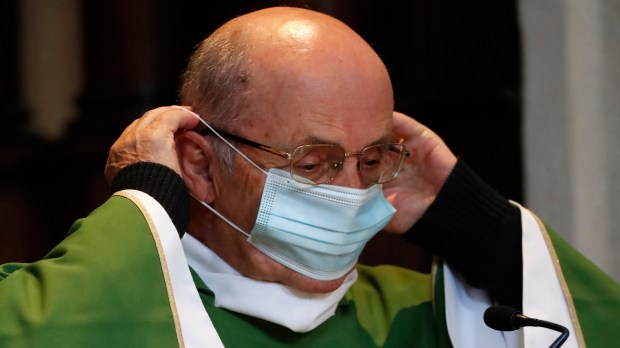Help Aleteia continue its mission by making a tax-deductible donation. In this way, Aleteia's future will be yours as well.
*Your donation is tax deductible!
Over the past 15 months of the COVID-19 pandemic, many Catholic priests have reported feelings of loss of identity, according to a Canadian psychologist.
Having to preach to empty pews and having to restrict people’s entrance into church, being unable to visit the sick or home-bound, cancelling events, and not hearing a congregation sing have all been “particularly difficult” on priests, said Fr. Stephan Kappler, president and chief psychologist at Southdown, an Ontario-based organization that supports the mental health of religious people and clergy.
“Many have said to me, ‘we never thought that we would become the police officer in the parish,’” Fr. Kappler told the B.C. Catholic, newspaper of the Archdiocese of Vancouver, British Columbia. “Instead of caring pastorally for their people, all they are doing is saying, ‘No, sorry, you have to register.’”
It doesn’t end there, though. The newspaper reported:
Others have felt the strain of being criticized from both sides, by some parishioners for being too strict and others by being not severe enough. In addition to that, the huge adjustment to using new technologies to keep livestreams and communications going since March of 2020 has been greatly wearing down some pastors.
But there are ways priests can help themselves overcome the stress, he said.
“What I have seen work is for people to be really intentional about social support,” Kappler told the newspaper. “In other words, you have to make an effort and plan to reach out and connect.”
Isolation and loneliness for extended periods “usually does not feed positive or adaptive strategies,” he said. “They usually feed into things that are maladaptive, like too much alcohol consumption or other numbing things.”
He encouraged pastors to set aside time for quality conversations with people they trust, take each day at a time, stay grounded in Jesus, and seek help if they need it.
“There is a high percentage of us clergy that are perfectionists,” he continued. “Perfectionism is on the one hand a good thing because it makes you efficient, responsible, and you want to do things that are a very high standard, but it also comes at a pretty high cost, and that cost is that there is no room for weakness.”
While people in general have difficulty asking for help, the problem is worse for clergy, he told the B.C. Catholic. “I have experienced that with priests, it’s exponentially more challenging to say ‘I need help.’ Sometimes priests are put on a pedestal and there’s still stigma attached to mental health.”
Lay people can, of course, help with prayers. But Kappler also suggested writing a card or letter with a simple message of encouragement, assurance of prayers, and a possible offer of support.
“Just to know that you’re thought of and you’re not alone in this,” he said, “that goes a long way.”

